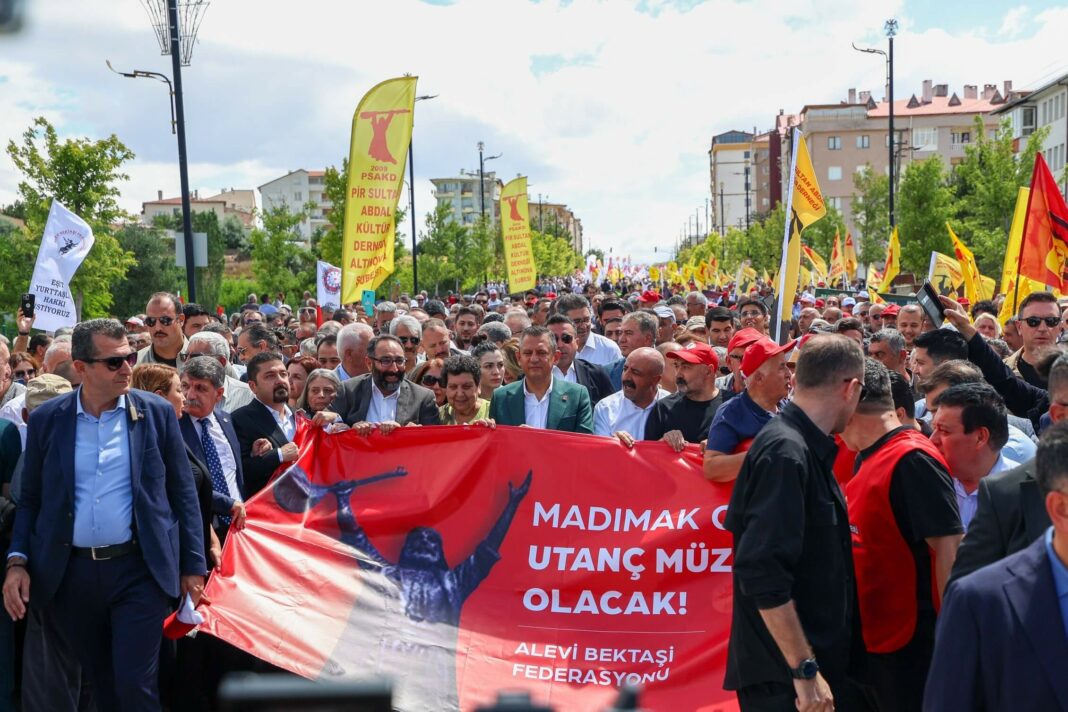Turkey’s main opposition leader has called on the government to recognize a 1993 fire at the Madımak Hotel in Sivas as a crime against humanity on the 31st anniversary of the massacre, the T24 news website reported on Tuesday.
On July 2, 1993 an angry mob torched the Madımak Hotel in Sivas, killing 35 people, mostly members of the Alevi sect, after a group of people gathered in front of the hotel following Friday prayer to protest left-wing Turkish intellectual Aziz Nesin, who was hated by religious Sunnis in Turkey since he had attempted to publish Salman Rushdie‘s controversial novel “The Satanic Verses.”
Thirty-three attendees, two hotel staff members and two protesters died in the fire. Nesin was able to escape because the attackers initially failed to recognize him.
The families of the victims commemorated their loved ones in the city on Tuesday, accompanied by a number of opposition politicians, including main opposition Republican People’s Party (CHP) leader Özgür Özel, pro-Kurdish Kurdish Peoples’ Equality and Democracy Party (DEM Party) Co-chairperson Tuncer Bakırhan and Erkan Baş, chairman of the Workers’ Party of Turkey (TİP), as well as representatives from Alevi organizations and CSOs.
Madımak katliamının 31'inci yılında yaşamını yitiren aydınlarımızı anıyoruz.
"Ailelerin ve bizim ortak talebimiz Madımak'ın Utanç Müzesi olmasıdır. Bu acıyı, bu katliamı unuttuayacağız."#UnutMADIMAKalımda pic.twitter.com/PsxM3EJO8f
— Özgür Özel (@eczozgurozel) July 2, 2024
They took part in a march to commemorate the victims of the massacre. The slogans “Don’t forget Sivas, don’t let anyone forget Sivas,” “Our [Alevis’] right to equal citizenship cannot be ignored” and “Those who burned Sivas are the ones who founded the AKP,” referring to the ruling Justice and Development Party (AKP), were chanted during the march.
Özel told reporters during the event that the decision last year to drop the legal proceedings against three defendants who were being tried in absentia for their alleged role in the massacre was “shameful” and demanded that the massacre be recognized as a crime against humanity.
The decision, which was made by the Ankara 1st High Criminal Court, caused disappointment and anger among the families of the victims as well as the country’s Alevi community. The court made its decision in line with an opinion presented by the prosecutor, who said the trial should be dropped due to the expiration of the 30-year statute of limitations.
“Crimes against humanity are not subject to the statute of limitations or [decisions of] amnesty. We will not recognize any [court] decision before a verdict [saying the Sivas massacre] was a crime against humanity is issued,” Özel said.
The CHP leader also pledged to turn the Madımak Hotel into a “museum of shame” in the next four to five years, in line with the victims’ families’ years-long request from the government.
Bakırhan also spoke to the press, saying the real perpetrators of the massacre haven’t been revealed since most of the defendants in the trial concerning the 1993 fire were acquitted and some were released following a commutation of their sentences on medical grounds by President Recep Tayyip Erdoğan.
Since 2020 Erdoğan has used his constitutional authority to commute the sentences of two individuals, Hayrettin Gül and Ahmet Turan Kılıç, who had been convicted for their roles in the 1993 massacre, citing chronic illness and advanced age.
“This is a crime against humanity. The president cannot grant clemency or release to people who have committed a crime against humanity,” Bakırhan said.
The Madımak Hotel attack has been described as one of the darkest days in Turkish history. The hotel was hosting an Alevi cultural festival, and the attackers targeted the attendees, many of whom were prominent intellectuals and artists.
Only 190 of the attackers were detained at the time among the thousands of protestors who had gathered around the Madımak Hotel, of whom 124 were indicted. There are conflicting reports about the number of people who were convicted at the trial as there had been several retrials. In 2000 there were 47 people in prison who were convicted, 33 of whom were given life sentences.
Over the years the number of people in prison has decreased with the release of some of them for various reasons.
The dropping of charges and the presidential amnesty caused a public outcry, and rights groups denounced it as another instance of the affording of impunity.
A number of lawyers who defended the suspects in the massacre later became politicians in Erdoğan’s ruling party.



